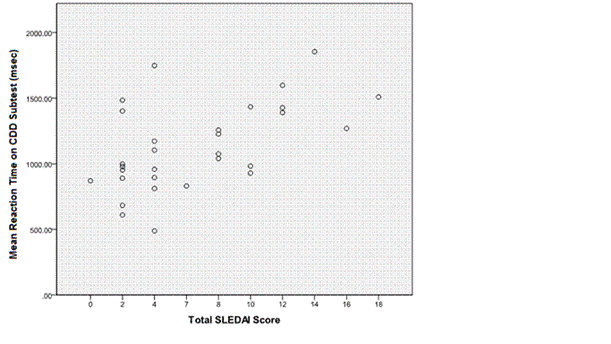Session Information
Session Type: Abstract Submissions (ACR)
Background/Purpose: Neuropsychiatric involvement appears to be common in childhood-onset systemic lupus erythematosus (cSLE), with neurocognitive dysfunction (NCD) identified in as many as 59%. NCD is typically detected via formal neuropsychological testing but it is costly, time intensive, not readily available, and requires specialized advanced training. Recently, computerized tests have been explored as more feasible screening tools of NCD such as the Pediatric Automated Neuropsychological Assessment Metrics (PedANAM), a library of automated tasks assessing various aspects of cognitive status. The objective of this ongoing study is to determine the feasibility of the PedANAM to monitor cognitive status in cSLE in a clinical setting.
Methods: cSLE patients (pts) were recruited from 5 pediatric rheumatology centers. Demographic and disease relevant information was recorded. The 10 subtests of the PedANAM were administered to each patient. Pts were observed for at least part of the testing to document effort (motivation) and technical difficulties.
Results: Initial baseline data for 34 of an expected 200 pts were analyzed (94% females; mean age of 15.8 yrs; White 41%, Black 35%, Hispanic 18%, Asian 6%). Pts were mostly in high school; 2 pts repeated a grade, and 5 received special school services. PedANAM completion required 35-55 minutes. Mean reaction time for correct responses (MNc; in msec) and accuracy (AC; % of correct responses) were measured for each subtest. All pts completed testing. Six pts responded randomly and unusually quickly, which may indicate reduced motivation. Overall, pts had the greatest difficulty comprehending requirements on the continuous performance subtest (CPT) that measures working memory based on observation, self-report and poor performance patterns (e.g. low AC and high MNc scores). Pts were grouped by presence vs. absence of neuropsychiatric SLE (NPSLE) symptoms. Those with at least one symptom were significantly slower on a test of recognition memory (Code Substitution Delayed subtest or CDD) and less accurate on the CPT subtest (p’s < .05). Using Pearson correlations, slower MNc and lower AC scores on the CDD were associated with disease activity measured by the SLEDAI (r= -.384; p = .036) (see Figure) and greater reported problems on the PCF-43 (r= -.463; p = .023).
Conclusion: This study demonstrated acceptable feasibility of the PedANAM to monitor cognitive status in a clinical setting. A few pts had difficulty with comprehension of test directions, particularly on the CPT, which may warrant re-evaluation of current test directions. These data demonstrate that slower performance on the CDD and less accurate performance on the CPT are related to greater disease symptomatology. Further research is needed to explore the relationship between cognition and cSLE activity. 
Disclosure:
P. Vega-Fernandez,
None;
E. Muscal,
None;
N. M. Ruth,
None;
F. Zelko,
None;
A. Vincent,
University of Oklahoma,
3;
E. C. Thomas,
None;
M. S. Klein-Gitelman,
None;
D. Canter,
None;
A. Tian,
None;
L. Ravindra,
None;
H. Liu,
None;
J. Hummel,
None;
D. M. Levy,
None;
H. Brunner,
None;
T. Roebuck-Spencer,
None.
« Back to 2012 ACR/ARHP Annual Meeting
ACR Meeting Abstracts - https://acrabstracts.org/abstract/pediatric-automated-neuropsychological-assessment-metrics-as-a-screening-tool-for-neuropsychiatric-childhood-onset-systemic-lupus-erythematosus/
